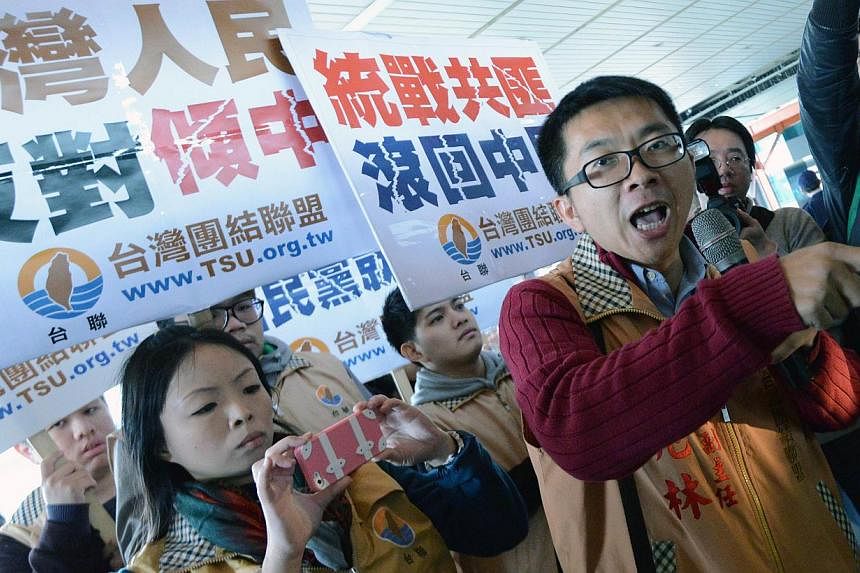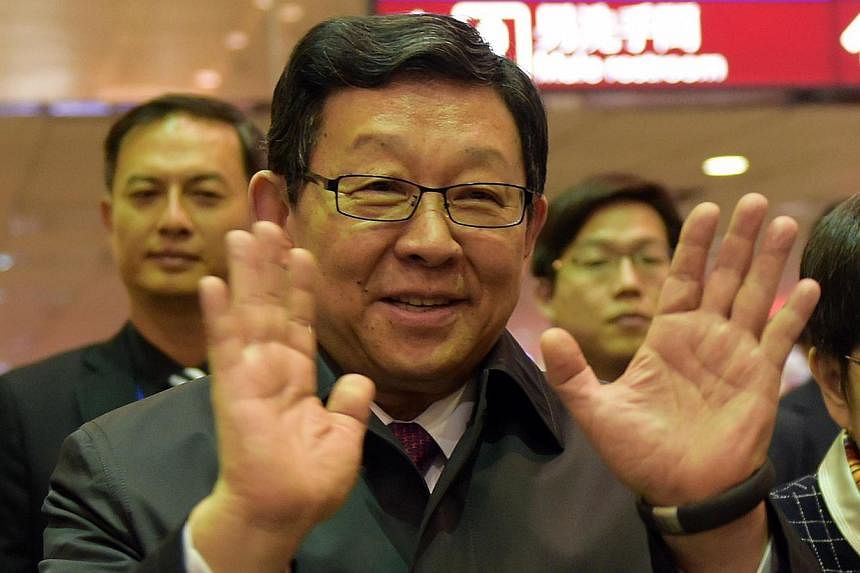TAIPEI (Reuters, AFP) - Dozens of demonstrators chanting anti-Beijing slogans protested Tuesday when a senior Chinese envoy arrived in Taiwan, the first such visit since the island's China-friendly ruling party suffered a major electoral setback last month.
The visit by Chen Deming, a former Commerce Minister who is now president of China's quasi-official Association for Relations Across the Taiwan Straits, comes amid growing fears about China's increasing influence on the island, which Beijing considers part of its territory.
Last month Taiwan's ruling Kuomintang (KMT) party, which has championed closer economic involvement with China, suffered a crushing defeat in local elections.
Outside the terminal building dozens of members from the Falungong spiritual movement and the radical pro-independence political group Taiwan Solidarity Union (TSU) staged a protest.
Some TSU members shoved and pushed police while attempting to force their way into the terminal. They were unable to meet Chen.
"Chen Deming, crawl back to China" and "Communist bandit, crawl back to China" read two of their signs. No-one was injured or arrested.
The eight-day visit by Chen's delegation, which includes Alibaba founder Jack Ma, is seen by many in Taiwan as aimed at gauging the mood on the self-ruled island towards its giant neighbour after a stinging election defeat for KMT. Chen said he and his delegation planned to visit venues related to the agriculture, bio-tech, volunteer and tourism sectors.
"We'll also attend a business forum where we'll discuss ways to see how we can work together to cope with the global economic situation," he said.
Elections on Nov 29 for mayors and councillors islandwide eroded the power base of the KMT, forcing President Ma Ying-jeou to step down as party chief.
"The KMT is the most important partner of China. The biggest loser in this election is China," said Wu Chi-chung, an associate professor at Soochow University in Taiwan.
Chen's Taiwanese counterpart Lin Join-sane last week called for the resumption of exchange visits interrupted by the local elections.
During a welcoming reception for Chen and his delegation in Taipei on Tuesday, Lin hailed steady progress in cross-strait relations.
He said there were more than eight million cross-strait visits in total last year and two-way trade amounted to US$197.2 billion (S$247 billion).
Such a "win-win" situation should be cherished, he said. "The two sides should keep working towards the goal of peace, prosperity and development."
President Ma has promoted tighter economic links with China, but mounting opposition - often on security grounds - has already seen cross-strait investment flows slow from his early years in office after the KMT regained power in 2008.
Chen Chung-Hsien, an official at the Ministry of Economic Affairs, likened the attitude in Taiwan to having a "big door" for inviting foreign investment, while the "door" for mainland Chinese investors was smaller due to restrictions they faced.
"You don't want anyone to see the tiny 'welcome' sign in front of that door for mainland investors," said Chen, who works in the ministry's Bureau of Energy, which is in charge of Taiwan's first offshore wind power generation project.
That project was knocked back in September when opposition lawmakers questioned the planned use of a Chinese-registered platform vessel and Chinese personnel, citing concerns over possible surveillance of Taiwan's coastal waters by China.
Chen said the ministry was waiting for a group led by domestic shipbuilder CBSC Corporation Taiwan to come back with new proposals for the contract to build initial infrastructure for offshore wind turbines in the Taiwan Strait. "If they really want to use a Chinese vessel, they would have to explain why there are no other alternative solutions,"Chen said.
Emile M.P. Chang, acting executive secretary for the Investment Commission, an agency of the economic affairs ministry, said Taiwan's National Security Bureau has become a regular presence in its monthly reviews looking at inbound and outbound investment applications.
The security bureau previously only took part on a case-by-case basis, he said, but has become a permanent fixture since thousands of mostly young protesters occupied parliament in March demanding greater oversight of deals with China, in what became known locally as the Sunflower Movement.
ELECTION PRESSURES
With a presidential election little more than a year away, support for the opposition Democratic Progressive Party (DPP) is being fuelled by suspicion of Beijing, which has never renounced the use of force against an island it deems a renegade province.
KMT officials have acknowledged that protracted pro-democracy protests in Hong Kong have heightened public concerns in Taiwan about closer links with China.
Chen's visit is part of regular exchanges between the association and its Taiwan counterpart, the Straits Exchange Foundation, that have been promoted under the KMT.
The last time a top official from China toured Taiwan, in June, protesters threw paint and scuffles broke out, forcing Taiwan Affairs Office head Zhang Zhijun to cut short his trip.
Critical to progress in cross-strait deal-making is an oversight bill for such agreements that has been held up in Taiwan's parliament. The logjam has put the ratification of a trade services pact, opposed during the March sit-in, in limbo.
One deal stymied as a result has been an April 2013 agreement for China's Industrial and Commercial Bank of China Ltd to take a 20 percent stake in the banking unit of Taiwan's Sinopac Financial Holdings Co Ltd.
The deal cannot take effect until the trade services agreement is ratified.
"We extended our contract (of intent) with ICBC this April. Both sides have agreed to extend it for a second time in April 2015, if necessary," said Michael Chang, chief financial officer for Sinopac Financial.
Supporters of such deals may take heart from the fact that the DPP acknowledges the importance of Taiwan's economic relationship with China, its biggest trading partner, and that senior party figures have met Chinese officials in recent years.
"There is no reason to think the DPP will completely reject cross-strait agreements," said Tsai Ming-hong, deputy secretary general for the Chinese National Federation of Industries, a lobby group representing most of the island's manufacturers.


